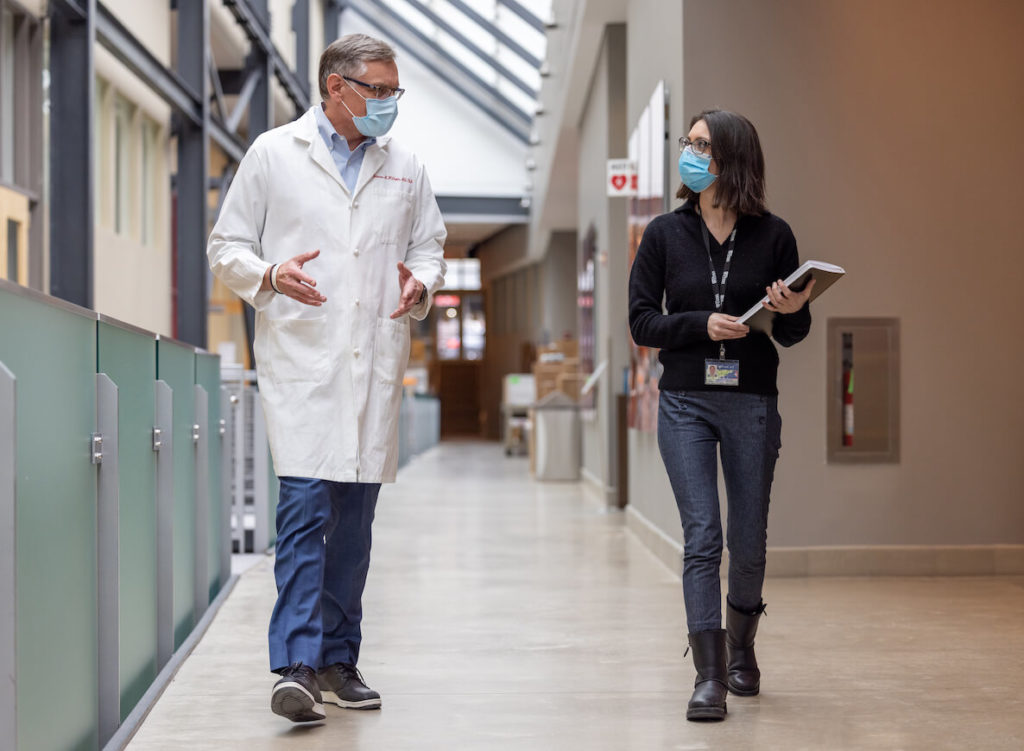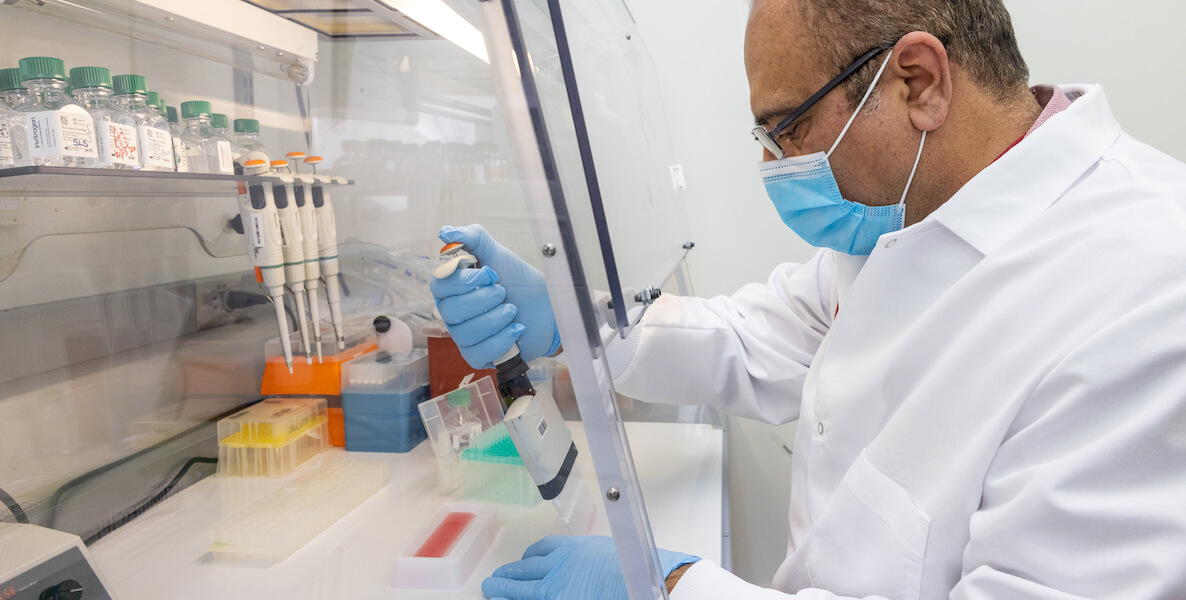![]() If Philadelphia is Idaho, then advanced medical innovation is our potato. Our intellectual soil is fertile, our farmers skilled and dedicated, and our produce is a burgeoning hotbed of exploration, discovery and innovation in the realm of medicine and health care.
If Philadelphia is Idaho, then advanced medical innovation is our potato. Our intellectual soil is fertile, our farmers skilled and dedicated, and our produce is a burgeoning hotbed of exploration, discovery and innovation in the realm of medicine and health care.
But if we are, as a region, to fertilize and tend to that soil, we must realize and support the great potential of our medical bounty. Today, a relatively unsung but enormously impactful group of dedicated Penn Medicine physicians, scientists and researchers is showing us the way forward.
A decade ago, James Wilson, MD, PhD, a professor and director of the Penn Gene Therapy Program, founded Penn Medicine’s Orphan Disease Center (ODC), a first-of-its-kind initiative dedicated to identifying promising therapies for rare diseases and tackling obstacles to rare disease drug development. Focusing on disorders with substantial unmet need independent of their incidence, the ODC aims to provide access to effective treatments for patients of all populations.
![]() Later this month, in commemoration of the ODC’s 10th anniversary, Dr. Wilson and his team have organized a blockbuster two-day symposium featuring former British prime minister David Cameron, National Institutes of Health director and pioneering gene scientist Francis Collins, and acting commissioner of the Food and Drug Administration Janet Woodcock, among other science, industry and advocacy leaders.
Later this month, in commemoration of the ODC’s 10th anniversary, Dr. Wilson and his team have organized a blockbuster two-day symposium featuring former British prime minister David Cameron, National Institutes of Health director and pioneering gene scientist Francis Collins, and acting commissioner of the Food and Drug Administration Janet Woodcock, among other science, industry and advocacy leaders.
To be sure, the ODC’s decade of success at the vanguard of rare disease research is directly attributable to Wilson’s vision and longstanding experience as a leader in gene therapy. In his lab, intensive investigation led to the discovery of Adeno-Associated Virus vectors, and their subsequent application to deliver healthy DNA into the correct cells. In the biopharma industry, at least 82 preclinical programs and 41 clinical programs use Wilson’s AAV vectors, and 58 percent of all gene therapy trials now use Penn-developed technology from Wilson’s lab.
The widespread application of these discoveries has benefited not just patients of rare diseases, but those suffering the effects of more common maladies as well.

As formidable a scientist as Dr. Wilson is, he is equally humble in sharing credit for his landmark accomplishments; the ODC emphasizes its collaboration with patient groups and foundations, pharma and biotech, and the academic community. And while it’s true that Wilson is the driving intellectual force behind the ODC output, it’s just as true that the support and partnership of these entities is a necessary condition to the creation of that output.
A long-time observer and borderline obsessive admirer of the seemingly miraculous, life-changing and life-saving innovations realized in our region’s medical research labs, I know that Wilson isn’t alone in talent, brilliance and a moral drive to make lives better. Among Wilson’s local scientific forebears is Penn’s Dr. Drew Weissman, who, along with his colleague the biochemist Katalin Karikó, discovered and published a series of landmark RNA modifications, paving the way for their use in critical immunotherapy applications—and for the Covid-19 vaccines.
Also at Penn Medicine, Wilson’s colleagues Katherine Choi, Roy Rosin, Kevin Mahoney and Megan Mariottie are revolutionizing health care delivery services and infrastructure; meanwhile clinician-scientists like Carl June, Bruce Levine and Robert Vonderheide are charting new paths in cancer immunotherapy research. And this cursory review of the local healthcare pantheon doesn’t even mention the mind-boggling dynamic projects underway at CHOP and Jefferson.
Though the scientific produce of these geniuses and their ilk may appear like miracles to laypeople like myself (to say nothing of the patients pulled back from the brink of suffering and death), they are, of course, the result of intensive, expensive work, conducted largely without fanfare and popular attention.
![]() To ensure the continuity and expansion of that work, our obligation as its beneficiaries is to provide essential resources, awareness and capital. The boldface names to be featured at the ODC’s 10th anniversary symposium will go a long way to casting a bright and overdue spotlight on the indispensable efforts of Dr. Wilson and his fellow cultivators, as the presence of international dignitaries and federal agency heads is expected to draw singular coverage in the mass media.
To ensure the continuity and expansion of that work, our obligation as its beneficiaries is to provide essential resources, awareness and capital. The boldface names to be featured at the ODC’s 10th anniversary symposium will go a long way to casting a bright and overdue spotlight on the indispensable efforts of Dr. Wilson and his fellow cultivators, as the presence of international dignitaries and federal agency heads is expected to draw singular coverage in the mass media.
And to augment that increased attention, sustaining its salutary effect in the long run, our region needs a multi-sector interdisciplinary collaboration that takes on the deep medical and public health challenges that face humanity; in fact, only such a collaboration can mount an offensive equal to the task.
A newly formed nonprofit, the Ark Institute is doing just that. (Full disclosure: I am founder and board chair, and my foundation funds the organization.) Bringing together a Philly-based consortium of individuals and institutions representing the philanthropic, life sciences, public health, and supply chain management sectors, the Ark Institute seeks to combine their expertise to synthesize the failures and lessons of the current response to the Covid-19 pandemic, and prepare to meet the next global health crisis head-on.
This reality is one that Wilson and the ODC have fully embraced, recognizing that while the essential science behind developing cures for the world’s toughest diseases may happen in the monastic confines of a laboratory, the funding, promotion and scalable delivery of those cures demands an all-hands-on-deck effort.
Thanks to the pragmatic, clear-eyed vision of innovators like Wilson, the world has begun to take notice of our region’s unmatched capacity and potential for changing human life for the better.
Ajay Raju is a Citizen co-founder and CEO of Raju LLP.





